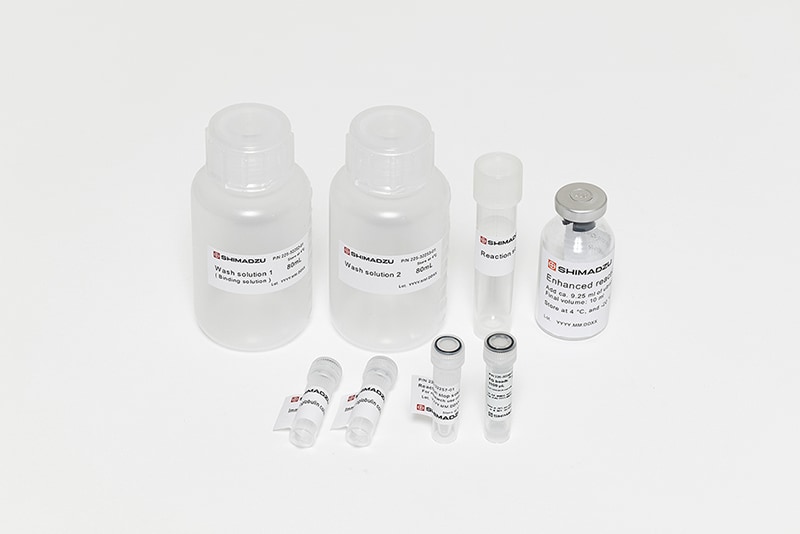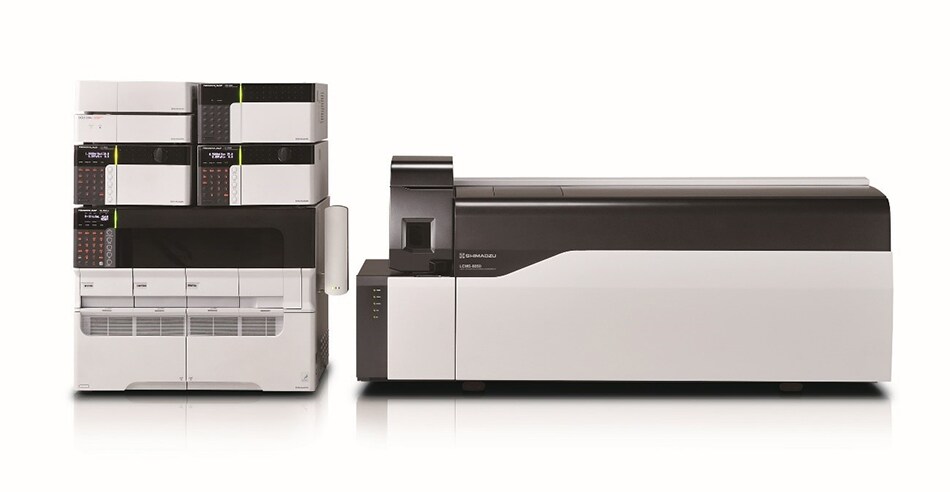
nSMOL™ Antibody BA Pretreatment Kit
Shimadzu Corporation and Kyoto University developed the novel assay method of multiplexed analysis of therapeutic antibodies for the treatment of inflammatory immune diseases.1) The antibodies were measured using an LCMS-8050/8060 high-performance liquid chromatograph triple quadrupole mass spectrometer and nSMOLTM Antibody BA Kit2). The results of the joint research were published on June 12 in the online version of the Journal of Immunological Methods. 3)
During the two years of collaboration from April 2017, we developed the multiple antibody assay for inflammatory immune diseases in human serum. Specifically, the technology can quantitate seven antibodies (infliximab, adalimumab, ustekinumab, eculizumab, golimumab, etanercept, and abatacept) in one analysis. The quantitative data was validated in accordance with the United States Food and Drug Administration (FDA) guidance.4)
Using serum samples collected over a period of about one year at Kyoto University Hospital, it was demonstrated that the multiplex quantitation data were reproducible within a 5 % error of the corresponding values determined by individual single assay. The research was conducted with the approval from the Kyoto University Graduate School and Faculty of Medicine, Kyoto University Hospital Ethics Committee (Approval Nos.: R0357, R0012, and R1632).
Given the importance of precise administration of therapeutic antibody for inflammatory immune diseases, therapeutic drug monitoring (TDM) provides an effective option to ensure appropriate use for individual patient. In recent years, there have been reports indicating the relationship between blood concentration and drug efficacy administered for several diseases. American College of Rheumatology (ACR) and European League Against Rheumatism (EULAR) are engaged in specifying efficacy criteria for blood concentration monitoring for rheumatoid arthritis.
Inflammatory immune diseases exhibit a variety of symptoms, and clinicians in many departments administrate different antibodies for each disease. Consequently, implementing TDM for each individual drug has some issues in terms of cost, burden on the patient, and other factors. Using this research approach, TDM of many antibody drugs for inflammatory immune diseases not only solve such issues, but also open up the possibility of establishing unified and cross-sectional treatment for multiple diseases. In addition, this research results can also be used during drug development to verify the therapeutic effects of biosimilars. By supporting the appropriate use of drugs, Shimadzu Corporation intends to continue the contribution for reducing the burden on patients and medical personnel, and inhibiting the rise in healthcare costs.
| 1) | A general term for diseases that immune system over-react and attack the self-cells and tissue. Typical examples include rheumatoid arthritis and inflammatory bowel diseases. |
| 2) | Pretreatment kit for ultra fast liquid chromatograph mass spectrometer system. Used in combiantion with an LCMS-8050/8060 system, the reagent kit can achieve simple, quick, accurate, and low-cost pharmacokinetic analysis of antibody drugs. Nano-surface and molecular-orientation limited proteolysis (nSMOL) is Shimadzu’s proprietary technology for quantitatively analyzing monoclonal antibodies by selective detection of the peptides on the Fab region of antibody molecules. |
| 3) | Multiplexed monitoring of therapeutic antibodies for inflammatory diseases using Fab-selective proteolysis nSMOL coupled with LC-MS. Iwamoto N, Takanashi M, Yokoyama K, Yonezawa A, Denda M, Hashimoto M, Tanaka M, Ito H, Matsuura M, Yamamoto S, Honzawa Y, Matsubara K, and Shimada T*. J Immunol Methods. 2019. 2019. 472:44-54. doi: 10.1016/j.jim.2019.06.014.. |
| 4) | https://www.fda.gov/files/drugs/published/Bioanalytical-Method-Validation-Guidance-for-Industry.pdf |

Photo: LCMS-8050 High-Performance Liquid Chromatograph Mass Spectrometer
For more details, visit
nSMOL™ Antibody BA Kit





